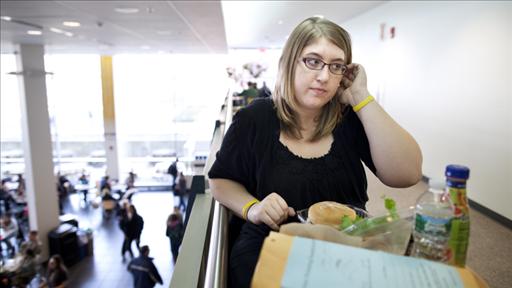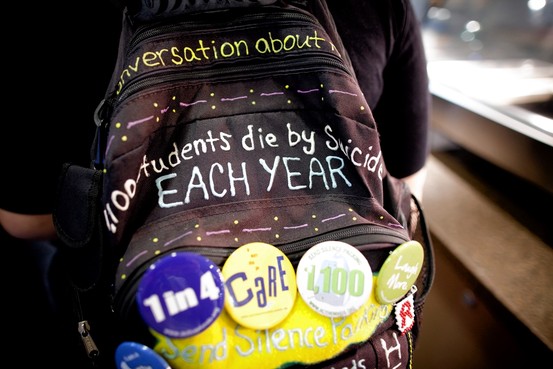A Serious Illness or an Excuse? – WSJ.com.
By ANDREA PETERSEN
Earlier this semester, college senior Leah Nelson emailed one of her instructors to ask for extra time to complete a paper. “I have been going through a rough patch lately and am making the decision to take care of myself this week,” Ms. Nelson wrote. Her mental health, she continued, would “take priority over everything else.”
Ms. Nelson, a 21-year-old student at the University of Connecticut in Storrs, struggles with depression. Her symptoms often flare when exams and papers pile up. She says the timing of a suicide attempt in March of 2010, when she took an overdose of Tylenol, was influenced by the pressure of the three exams and paper due she had that week.
Ms. Nelson is one of a growing number of college students asking for wiggle room with their academic workloads due to mental health issues.
In some cases, students make direct pleas to professors. In others, students work through their university’s disability office to receive official academic “accommodations.” These can include extra time for exams, the opportunity to take tests in a quiet room, or flexibility with class attendance and assignment deadlines.
Schools are required to extend “reasonable accommodations” for students with documented disabilities—including psychological ones—to comply with the federal Americans with Disabilities Act.
The Other College Application Process
To qualify for academic accommodations, most schools require students with mental health issues to go through a fairly extensive application process. It generally includes:
•A recent evaluation from a psychiatrist, psychologist or social worker.
•A disorder included in the DSM-IV, the primary handbook for diagnosing mental illnesses.
•A professional assessment of how the disorder affects the student academically and why specific accommodations are needed.
•There is often a deadline for applying: Some schools require applications at the beginning of the semester. Some require students to apply a certain number of days before the accommodations are necessary, say, two weeks before an exam where they’ll need more time.
But there’s hand-wringing among university administrators and faculty about how to support college students with mental health issues while making sure young adults progress academically. One of the goals of college, after all, is to prepare students for the working world. And not every boss may be OK with a blown deadline for a critical client report, no matter the reason. Professors also want to make sure they’re being fair to all students.
“There’s the danger that we take too much care and when they hit the real world that same kind of support isn’t there,” says David Cozzens, dean of students and associate vice president of student affairs at the University of Wyoming in Laramie.
Some formal accommodations, like additional test time, are fairly standard across universities and apply to students with physical and learning disabilities, too. But, schools diverge widely on formal accommodations for flexibility with assignment deadlines, class attendance and participation. Some schools leave it up to individual instructors. Others intervene more directly on students’ behalf.
Schools say they are seeing a rise in the number of students registering with their disability offices due to psychological problems. At Pace University in New York, the number of requests for accommodations from students with disabilities related to psychological disorders tripled in the last three years.
At the University of Texas at Austin, 33% of the 1,687 students that registered with the disability services office during the spring 2011 semester listed psychological problems as their “primary” concern. In the spring of 2008, only 23% out of 1,175 did. (The increase was due, in part, to a procedural change that routed more students to the disability office.)
Colleges say they’re seeing more students on campus with psychiatric illnesses. About 11.6% of college students were diagnosed or treated for anxiety in the last year, and 10.7% were diagnosed or treated for depression, according to a survey of more than 100,000 students at 129 schools conducted by the American College Health Association. Many mental illnesses, particularly depression, bipolar disorder and schizophrenia, emerge during late adolescence.
Psychiatric disorders like depression and anxiety can have serious academic consequences because they affect concentration, sleep and cognitive processing, say mental health professionals.
It’s unclear why the incidence of psychiatric disorders appears to be rising among college students. Better medications and treatments are likely making it possible for more young adults with even serious mental illnesses to attend college. Many schools have launched programs to identify students with psychological problems and get them into counseling. Student-advocacy groups like Active Minds Inc., an organization with chapters on 325 campuses, are trying to reduce the stigma around having a mental illness.
Cornell University in Ithaca, N.Y., has developed an extensive suicide-prevention program and a comprehensive disability services office. But it is pulling back on how involved it gets in student-faculty negotiations not covered by the office.
Over the last several years, the counseling center has stopped issuing dated “verification of visit” notes. Too many students were making appointments just to get the notes to provide proof of why they missed class or failed to turn in an assignment, says Greg Eells, director of counseling and psychological services. (The school’s health center stopped giving notes for medical appointments, too.)
“It was just not a good use of the university’s resources,” says Mr. Eells. But professors pushed back. “The faculty wants us to be a detective to see if the student is telling the truth. That’s not our job,” he says.
If students complain of psychological problems, some faculty members will send them to the disability services office to avoid having to determine what’s a serious issue versus what’s a gloomy day. Then, “the instructor isn’t having to make decisions on something they’re not equipped to assess,” says Steven Barrett, a professor of electrical and computer engineering at the University of Wyoming.
In the fall of 2010, Amy Goodnough, now a senior at the University of Vermont, started experiencing severe insomnia and excess energy. Some mornings, she couldn’t get out of bed. Eventually diagnosed with bipolar disorder, Ms. Goodnough withdrew from one class, took an incomplete in another and appealed directly to other professors to turn in some assignments late. “It was difficult to know day to day what my energy would be like,” Ms. Goodnough, 21, says. “I kind of crawled through the end of the semester.”
Before the spring term, she registered with the university’s disability services office and received letters to take to her professors stating that she be allowed “limited” flexibility with attendance and deadlines. Without those accommodations, “I don’t think I could have stayed in school,” that semester, she says. Now getting effective treatment, Ms. Goodnough has not needed the flexibility this term and has a 3.9 grade-point average.
Schools say they can’t require faculty to adjust deadlines or attendance policies. And in some courses, like science labs and speech classes, participation is critical, but schools can push instructors to compromise with students.
Students with mental illnesses “don’t know when the symptoms will happen, when they might be incapacitated,” says Laurel Cameron, the director of ACCESS, the University of Vermont’s disability services office. Even with a letter giving a student flexibility with deadlines and attendance, students are required to negotiate with each instructor at the beginning of the semester. They need to devise a plan, for example, of when to notify faculty of an absence and a timetable for making up work.
To help students prepare for those discussions, Ms. Cameron says she and her staff will role-play with students, taking on the tone of a skeptical professor.
Kim Larrabee, a faculty member at UConn and the instructor Ms. Nelson emailed for an extension, says she has a “sense of intuition of sincerity,” when students approach her for flexibility with academic work. And she considers how committed the student has been so far to the course. She gave Ms. Nelson an extra 10 days to finish her paper.
“I think your decision to take care of your needs shows maturity and commitment,” Ms. Larrabee wrote in an email replying to Ms. Nelson’s request. Ms. Nelson got an A on the paper.
![[COLLEGE11]](https://rorybatchilder.com/files/si.wsj.net/public/resources/images/pj-be171_colleg_g_20111212191319-resize-387-258.jpg) Sally McCay
Sally McCay



